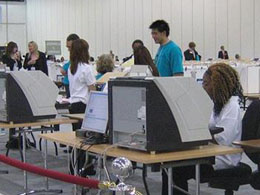
Blockchain voting is the alternative for trusted democratic elections
There is a way to give the voting system greater legitimacy and veracity: backing it with blockchain technology. The COVID-19 pandemic has impacted people’s lives, the relationship between governments and citizens, and the entire world economy, and of course, it has had a major impact on the United States presidential election.Due to social isolation, a large number of American voters opted to vote by mail, which increased vote counting time, led candidate and acting President Donald Trump to judicialize the electoral process with actions in several states, and triggered intense debates....
Related News
Romania is the first EU country to use a voting reporting tool that is based on blockchain technology for national elections. For the first time in Romania, the recent national parliamentary elections, which were held in November, used blockchain technology with the main purpose to guarantee the integrity of the electoral process and to strengthen its transparency. The government aimed to ensure tamper-proof and real-time data on voters’ presence.There is still a way to go for the voters to be empowered to record, manage, count and check the votes themselves (without bypassing it to the....
The Expanse Project has announced the development of a blockchain-based voting platform, which, according to developers, has “the potential to change the dynamics of future elections.” Expanse Wants to Take Voting to the Blockchain. According to a press release, this new project will provide voting services secured by an immutable blockchain. By virtue of the blockchain technology, said the Expanse team, their voting protocol will store voting data forever in a tamper-proof manner that is accessible across the globe. This platform reportedly makes voting easier, while making it harder to....
Experts explain why blockchain-based systems are still more efficient then paper ballots or online voting systems The 2020 United States presidential election was met with an increase in mail-in ballots due to COVID-19 concerns. Yet while many Americans stayed away from polling stations this year, postal delays, rejected ballots, and other challenges emerged.Unsurprisingly, better ways for casting votes during major elections quickly became a hot topic of discussion. This has also led some in the crypto community advocating with renewed vigor for a blockchain-based voting system to be used....
How can a voting platform that touts transparency also be secure? That’s the question posed by Jackie Burns Koven, a Research Assistant of Technology and Public Policy at Columbia’s School of International and Public Affairs in her published piece by Forbes. It looked into how the solution to safeguard against vote rigging could be through the adoption of blockchain technology as advocated by some cybersecurity experts who see offline paper-based elections as the ultimate security measure to protect U.S. elections from foreign tampering. This is based on increasing concerns that hackers....
Originally designed to democratize power within the financial system, Bitcoin's blockchain technology is now playing a role in the area of democracy itself. Despite receiving much attention, online voting adoption has yet to take off meaningfully worldwide, amid concerns that existing platforms are vulnerable to fraud, corruption and sabotage. Last year a team accredited to observe the 2013 municipal elections in Estonia - the only country to run Internet voting on a wide scale - revealed that they observed election officials downloading key software over insecure Internet connections,....





